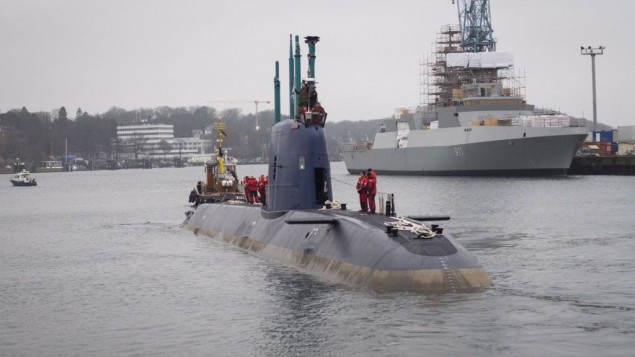Israeli nuclear power grows with new submarine
War Germany, which builds Israel’s submarines, is helping to create a floating atomic arsenal in the Middle East that nobody talks about.
 The "Rahav" leaves the port of Kiel in Germany – Idf
The "Rahav" leaves the port of Kiel in Germany – IdfWar Germany, which builds Israel’s submarines, is helping to create a floating atomic arsenal in the Middle East that nobody talks about.
As the U.S. Congress discusses its all-but-certain renewal of $3 billion in annual funding to Isreal, mainly for military use, the spokesman of the Armed Forces of the Jewish state has released photos of the submarine Rahav (“Neptune” in Hebrew) leaving the German port of Kiel for Haifa.
The Rahav is the last of the submarines of Dolphin II-Class, made in Germany, to go into service amid international silence. The weapon will further increase the nuclear capacity of Israel, which has never signed the Nuclear Non-Proliferation Treaty and continues to keep secret its nuclear arsenal. Some experts believe it contain perhaps 100 to 200 bombs.
Built by Howaldtswerke-Deutsche Werft, at a cost of $2 billion paid by Germany (as part of reparations for the Holocaust), the Rahav is not nuclear-powered, but, like two of the other four submarines Germany built for Israelis, it is capable of carrying missiles with nuclear warheads in seas of the Middle East and the Indian Ocean. If the United States are guarantors of the military superiority of Israel in relation to other countries in the region, Germany’s Angela Merkel for years has contributed to create a fleet of submarines that can be equipped with non-conventional weapons.
With the help of Berlin, Israel can fire Popeye missiles armed with 200-kilogram nukes a range of 1,500 kilometers — far enough to reach the “enemy” Iran, but also Syria, all the other Arab countries and part of Central Asia.
Three years ago, the German magazine Der Spiegel published a 12-page report entitled “Operation Samson,” explaining that the Israeli missiles with nuclear warheads can be launched from submarines thanks to a next-generation hydraulic system. “Using German technology, Israel has created a floating nuclear arsenal in the Middle East,” the newspaper wrote.
Merkel has always denied that the submarines delivered to Israel are capable of carrying nuclear warheads. But in fact, according to Der Spiegel, the German government is aware of the nuclear-capable submarines but agrees to look the other way in the name of the “security of Israel.”
Ronen Bergman, a military analyst for the Tel Aviv daily Yedioth Ahronoth, wrote that in Israel’s strategic vision, the Rahav and other submarines bound for Israel would guarantee the ability of the “second shot.” In other words, the ability to respond to a nuclear attack from enemies.
But other non-Israeli experts argue that the submarines are charged with asserting the military superiority and the nuclear power of the Jewish state in the region. The subs are a deterrent, or, to put it another way, a constant unknown threat off its opponents’ coasts. It is therefore a strategic capability that the Rahav, its predecessor Tanin and the sixth Israeli submarine now being built in Germany, are able to stay underwater for up to 18 consecutive days.
The only winner in all of this is perhaps Eritrea. The country will provide a strategic naval base in the Dahlak Archipelago to Israeli submarines, which would alternate to maintain constant pressure on Iran and to monitor ships entering Tehran in the Red Sea, according to the research center Stratfor. Eritrea is meanwhile supplying Iran with a port in Assab for the Iranian Navy, in exchange for weapons and financial aid from both countries.
–> Originally published in Italian at il manifesto on Dec. 20, 2015
I consigli di mema
Gli articoli dall'Archivio per approfondire questo argomento